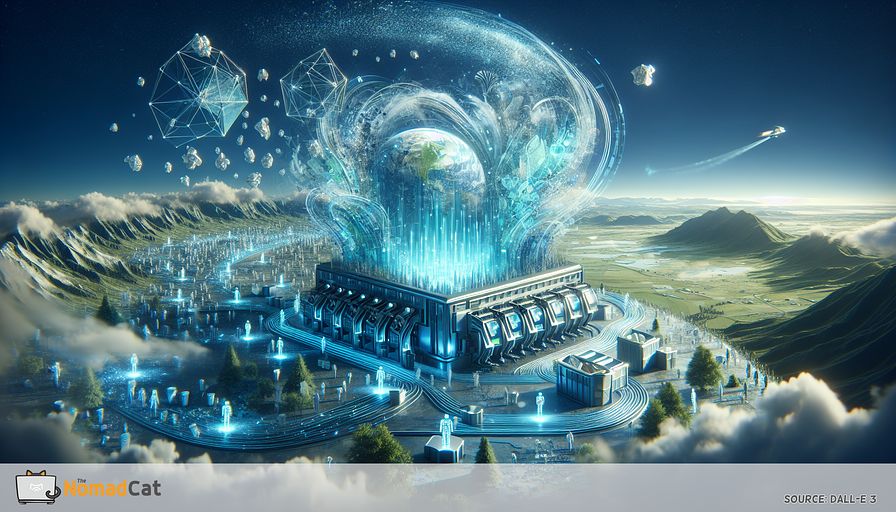Abstract:
With global waste volumes escalating at an unprecedented rate, the urgency for efficient recycling methods has never been more acute. This article explores how cutting-edge technology is transforming traditional recycling processes, presenting a new era of tech-driven waste management solutions. From the deployment of AI and machine learning for sorting recyclables with remarkable precision to the use of blockchain for enhancing transparency and accountability in recycling operations, these advancements are setting the stage for a more sustainable future. Moreover, innovative mobile apps are empowering individuals to contribute to recycling efforts, making eco-friendly practices more accessible. By harnessing these technologies, businesses and communities are not only addressing pressing environmental concerns but also unlocking economic opportunities by reducing waste disposal costs and generating value from repurposed materials. This narrative signifies a pivotal shift towards integrating technology into sustainability efforts, emphasizing the vital role that innovation plays in fostering a greener planet.
the growing challenge of waste management
Is it just us, or does it feel like the garbage heap is growing larger every year? That's not just perception – it's reality. Our planet is grappling with a dramatic surge in waste volumes, thanks to rapid urbanization, industrialization, and, of course, our consumer-driven lifestyles. The numbers are staggering. Globally, humans produce over 2 billion tons of waste annually, with the figure expected to rise by 70% by 2050. Yikes!
Improperly managed waste isn't just an eyesore; it's an environmental time bomb ticking away. Landfills are overflowing, causing leachate to seep into groundwater, posing risks to both human health and biodiversity. The release of potent greenhouse gases like methane from decomposing organic waste is another alarming consequence. If we don't take action, these problems won't just recycle themselves – they'll multiply.
This backdrop brings us to the crux of the matter: the urgent need for effective waste management solutions. Traditional methods like landfilling and incineration are neither sustainable nor efficient. They pose significant environmental and health hazards without adequately addressing the core issue. Clearly, it's time to find more innovative, technology-driven approaches that can turn this mess into a message of environmental stewardship.
Here's where the marvels of modern technology come into play. Imagine harnessing the power of artificial intelligence, blockchain, and mobile applications to not just manage waste but revolutionize the entire process. It's not a far-fetched idea; it's a tangible reality that's starting to take shape. By making waste management smarter, more transparent, and user-friendly, we can tackle this global challenge head-on and, perhaps, even have a bit of fun along the way. Because who said saving the planet has to be all doom and gloom?
revolutionizing recycling with AI and machine learning
Ever felt overwhelmed trying to sort paper from plastic, or wondered if that greasy pizza box belongs in the recycling bin? You're not alone. Fortunately, artificial intelligence (AI) and machine learning are stepping in to take the guesswork out of recycling. These technologies are revolutionizing the way we manage recyclables, making the process more accurate, efficient, and a whole lot cooler.
At the heart of this tech-driven evolution are automated systems that use AI to enhance the precision of sorting recyclables. Traditional recycling methods often rely on manual sorting or rudimentary mechanical processes that can be slow, inefficient, and prone to human error. In contrast, AI-driven systems can analyze and sort waste materials with unprecedented speed and accuracy. How? By employing advanced sensors and machine learning algorithms that can identify and categorize different types of waste on a conveyor belt in real-time.
AI-powered robots: the unsung heroes
Meet AI-powered robots, the unsung heroes of modern recycling facilities. These intelligent machines are equipped with a range of sensors, including cameras and infrared detectors, to recognize various materials. They "see" waste in a way that's similar to how humans do, but with an added layer of precision and consistency.
Here are some noteworthy examples:
- AMP Robotics: Utilizing a combination of computer vision and machine learning, AMP Robotics' systems can sort paper, plastics, and metals with up to 99% accuracy. These robots can learn and adapt over time, improving their efficiency as more waste is processed.
- ZenRobotics: This Finnish company takes recycling to the next level with their AI robots capable of differentiating between complex waste types. Their automation enhances the valorization of mixed construction and demolition waste, turning what was once trash into treasure.
From guesswork to precision: the magic of machine learning
Machine learning algorithms are the secret sauce behind this impressive accuracy. When waste materials pass by the sensors, the data collected is analyzed and processed instantly. The machine learning models have been trained on vast datasets of waste images, teaching them how to correctly identify and classify each item. Think of it as garbage recognition software that gets smarter with each item it processes.
What's more, machine learning isn't just about sorting – it's about optimizing the entire recycling workflow. By analyzing the data collected, these systems can identify bottlenecks and inefficiencies, and make real-time adjustments to improve throughput and reduce waste contamination. Less guesswork, more precision – it's a win-win.
So next time you toss a bottle into the recycling bin, remember: an army of smart robots and clever algorithms might be working behind the scenes to ensure it finds its way to the right place. It’s recycling, but with a turbocharger in the form of AI and machine learning. And who knows? Maybe in the not-so-distant future, these technologies will even predict what you’ll recycle next. Now that’s some intelligent trash talk!
enhancing transparency with blockchain technology
Blockchain technology isn’t just for Bitcoin enthusiasts and crypto nerds anymore. It’s stepping into the spotlight as a game-changer for the recycling industry, bringing unparalleled transparency and accountability. By leveraging blockchain, recycling operations can trace recyclable materials throughout their entire lifecycle, ensuring that they actually make it into the right processing channels. And let's face it, in a world where trust is often in short supply, the integrity of data along the recycling supply chain is a breath of fresh air.
traceability and transparency: the benefits of blockchain
Blockchain's main superpower is its capacity to create a permanent, immutable ledger of transactions. When applied to recycling, this means that every step – from collection to processing to final reuse – can be documented and verified. Once data is added to the blockchain, it can't be altered or deleted. This transparency ensures that all parties involved can trust the information, significantly reducing the potential for fraud or inefficiency.
Consider these benefits:
- Enhanced accountability: Every piece of recyclable material can be tracked, ensuring that it doesn’t mysteriously vanish en route to the recycling plant or end up in a landfill instead.
- Improved data integrity: With blockchain, data about recycling processes is tamper-proof. This means everyone – from waste collectors to government agencies – can trust the information.
- Consumer trust: When people know their recyclables are being handled correctly, they're more likely to participate in recycling programs. Transparency fosters trust, which boosts participation rates.
blockchain in action: real-world applications
So, how is blockchain being used in actual recycling operations? Let’s look at a few examples:
Plastic Bank: This social enterprise uses blockchain to reward individuals in developing countries for collecting plastic waste. Each transaction is recorded on the blockchain, ensuring collectors receive fair compensation and that the plastics are properly processed.
VeChain: This blockchain platform tracks and certifies the recycling of materials, particularly in industries like electronics where waste can be hazardous. VeChain provides transparent data that helps ensure responsible disposal and recycling.
RecycleGo: This company is pioneering blockchain technology to track recyclables, providing proof of recycling to businesses and consumers alike. Their platform allows for a transparent supply chain, reducing waste and increasing recycling rates.
By ensuring that every step in the recycling process is recorded and visible, blockchain is transforming recycling operations into more sustainable, efficient, and – dare we say – trustworthy endeavors. So next time you drop off those bottles, take comfort in knowing that blockchain's got your back, and your recyclables, too.
empowering individuals with mobile apps
We all carry tiny supercomputers in our pockets, so why not use them to save the planet? Mobile apps are stepping up to make recycling as easy as ordering food or hailing a ride. These handy tech solutions are simplifying the recycling process, educating users, and connecting them to local recycling centers like never before. By breaking down barriers and adding a touch of convenience, mobile apps are turning everyday citizens into eco-warriors.
making recycling a breeze
If you've ever stood in front of multiple bins, paralyzed by indecision on where to toss that yogurt cup, you’ll appreciate how mobile apps can cut through the confusion. Many apps offer detailed guidance on what can and cannot be recycled, often customized to local regulations. It's like having a waste management expert right in your pocket. Some standout features include:
- Barcode scanning: Apps like RecycleNation allow users to scan product barcodes to get immediate recycling instructions. No more guesswork!
- Searchable databases: Platforms like iRecycle provide searchable directories to quickly ascertain how various items should be disposed of.
- Pick-up schedules: Apps such as MyWaste offer notifications for local curbside pick-up schedules, helping you never miss your recycling day (even if you miss everything else!).
education and gamification
Beyond simplicity, these apps aim to educate and incentivize. Knowledge is power, right? And if recycling can be fun, even better! Here’s how mobile apps are turning recycling into an educational and entertaining experience:
- Sustainability tips: Apps like Recycle Coach provide users with practical tips and information on sustainability, helping them make greener choices every day.
- Gamification: Recyclebank rewards users for their recycling efforts with points that can be redeemed for discounts and deals. It’s like a frequent flyer program, but for being eco-friendly.
- Interactive quizzes: Some apps feature quizzes and challenges to test your recycling knowledge, making learning about waste management surprisingly engaging.
connecting to local recycling centers
One of the significant benefits of these mobile apps is their ability to bridge the gap between individuals and local recycling centers. Forget scouring the internet or making countless phone calls. Here’s how these apps get you in touch with the right places:
- Location-based services: Apps like EcoFinder use your location to direct you to the nearest recycling centers, making drop-offs a breeze.
- Special item disposal: Apps such as Earth911 offer directories for hard-to-recycle items like electronics or batteries, ensuring nothing ends up in the landfill unnecessarily.
- Community engagement: Apps sometimes feature community boards where users can share local recycling events, initiatives, or swap items. It’s recycling with a social twist!
So next time you’re considering throwing something in the trash out of sheer confusion, remember there’s an app for that. With features designed to instruct, engage, and connect, mobile applications are transforming everyday folks into informed and enthusiastic recyclers. Now, thanks to technology, saving the planet can be just as easy as scrolling through your favorite social media feed. Who knew recycling could be so, well, modern?
economic and environmental benefits of tech-driven waste management
Integrating technology into waste management isn't just about pushing boundaries; it’s about reaping significant economic and environmental benefits. Businesses and communities stand to gain not only in terms of reduced waste disposal costs but also by discovering new avenues for generating value from materials that would otherwise be discarded. Let's break down how technology is making waste management a win-win for both the economy and the environment.
cost savings and revenue generation
The financial implications of tech-driven waste management strategies are noteworthy. Traditional waste disposal methods such as landfilling and incineration can be expensive, both in terms of direct costs and the hidden costs of environmental degradation. Here's how technology can flip the script:
- Operational Efficiency: Smart sensors and IoT-enabled vehicles can optimize waste collection routes, reducing fuel consumption and labor costs.
- Material Reclamation: Advanced sorting technologies, like AI-powered robots, ensure valuable materials are recovered more efficiently, which can then be sold or reused.
- Reduced Landfill Fees: With less waste ending up in landfills, communities can lower the expenses associated with tipping fees and potential fines for overcapacity.
These savings can then be redirected into other community programs or business initiatives, making waste management not just a necessity, but a smart financial decision.
environmental benefits and sustainability
On the environmental front, technology is playing a pivotal role in reducing the carbon footprint associated with waste management. By optimizing processes and encouraging recycling, technology helps us move closer to a zero-waste future. Here’s a closer look at the environmental advantages:
- Greenhouse Gas Reduction: Efficient waste sorting and processing technologies can significantly cut down the methane emissions from improper disposal of organic waste.
- Energy Conservation: Recycling materials like aluminum and plastics typically consume less energy compared to producing new materials from scratch. This energy saving translates to a smaller carbon footprint.
- Pollution Prevention: By ensuring that hazardous materials are properly identified and processed, we can prevent soil and water contamination. Cleaner surroundings, healthier communities.
unlocking new economic opportunities
Technology isn't just about reducing costs; it’s about creating new economic opportunities. The emerging field of “waste-to-resource” is a testament to how discarded materials can be repurposed into valuable products. Examples include:
- Secondary Raw Materials: Recovered materials can be reintroduced into manufacturing processes, reducing the need for virgin resources.
- Waste-to-Energy: Technologies that convert waste into energy can provide renewable sources of power, reducing reliance on fossil fuels.
- Innovation and Startup Potential: The tech-driven waste management sector is ripe for innovation, opening doors for startups and investors keen on sustainable solutions.
By turning waste into a resource, we’re not just cleaning up our act; we're also fueling economic growth and innovation. Who knew rubbish could be so lucrative?
In conclusion, the integration of technology into waste management presents a compelling case for both economic efficiency and environmental stewardship. With the dual benefits of cost savings and revenue generation, alongside significant environmental gains, it's clear that tech-driven waste management is a smart and sustainable choice for our future. And if it makes the planet a cleaner and more pleasant place to live, that’s the cherry on top!
the future of waste management through innovation
It's clear that the marriage of technology and waste management holds incredible promise for a cleaner and more efficient future. From AI-driven recycling solutions to blockchain ensuring transparency and mobile apps empowering individuals, innovation is turning waste management from a chore into a sophisticated operation.
the critical role of technology
AI and machine learning are removing the guesswork out of recycling, making the system more efficient and accurate. Blockchain technology is offering unprecedented transparency, ensuring every piece of waste is accounted for. Mobile apps are making it easier for individuals to recycle correctly, turning everyday actions into meaningful contributions.
benefits worth noting
- Economic gains: Cost savings from streamlined processes and revenue from reclaimed materials.
- Environmental advantages: Reduction in greenhouse gases, conservation of energy, and prevention of pollution.
- New opportunities: The creation of secondary raw materials, renewable energy sources, and innovative startups.
What's next? Adopting tech-driven solutions isn't just about staying current; it's about ensuring future generations inherit a healthier planet. By supporting and integrating these technologies, we have the power to turn waste into valuable resources and play our part in a sustainable future. So, let’s embrace these innovative solutions and make waste management not just smarter, but seriously cool.





